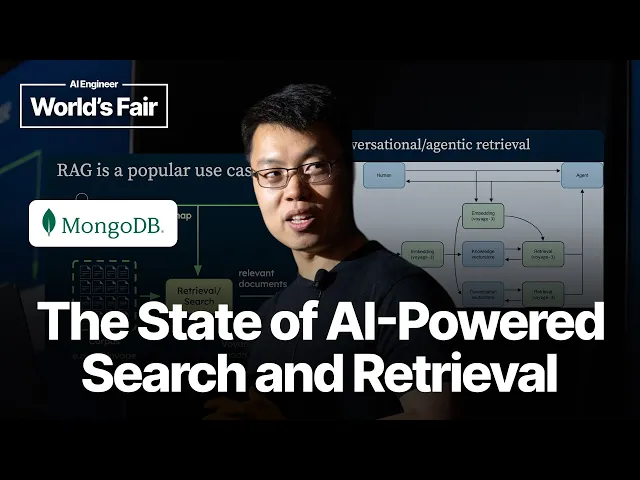The State of AI Powered Search and Retrieval — Frank Liu, MongoDB (prev Voyage AI)

AI search is rewiring enterprise data retrieval
In an era where information access defines competitive advantage, AI-powered search stands at the precipice of transforming how businesses interact with their data. Frank Liu's comprehensive overview presents a timely examination of how neural search technologies are evolving beyond traditional keyword matching to understand the semantic meaning behind queries. This shift represents not just a technical improvement but a fundamental reimagining of the enterprise search paradigm.
Key Developments in AI Search
- Vector search has matured significantly, moving from research labs to production-ready systems that complement traditional retrieval methods by capturing semantic relationships traditional indexing misses
- Hybrid retrieval approaches combine the precision of keyword-based systems with the understanding capabilities of neural networks, addressing the limitations each method faces when used in isolation
- Enterprise search faces unique challenges beyond consumer applications, including specialized domain knowledge, diverse data formats, and stringent security requirements that pure academic solutions often overlook
- RAG (Retrieval Augmented Generation) systems represent the leading edge, using retrieval mechanisms to ground LLM outputs in factual information, reducing hallucinations while maintaining fluency
The most compelling insight Liu offers is how retrieval systems must adapt to the multi-faceted nature of enterprise data ecosystems. Unlike consumer search domains, where content is relatively homogeneous, enterprise environments contain structured databases, unstructured documents, code repositories, and multimedia assets—each requiring specialized handling. This diversity demands architectures that can seamlessly integrate different retrieval methods while maintaining a unified interface for users.
This matters profoundly because information retrieval sits at the heart of knowledge work productivity. McKinsey estimates that employees spend nearly 20% of their workweek searching for internal information. Improving retrieval efficiency through AI could reclaim millions of work hours annually across the global economy. More importantly, better search means better decisions, as executives and knowledge workers can access the complete picture rather than whatever information happens to be most readily available.
What Liu's presentation doesn't fully explore is the organizational change management required to implement advanced search systems. Technical capabilities alone won't drive adoption. At Microsoft, their implementation of semantic search required not just new algorithms but a comprehensive content governance strategy that standardized metadata practices across previously siloed business units. Without this organizational alignment, even the most sophisticated AI search tools struggle to deliver value.
Another
Recent Videos
How To Earn MONEY With Images (No Bullsh*t)
Smart earnings from your image collection In today's digital economy, passive income streams have become increasingly accessible to creators with various skill sets. A recent YouTube video cuts through the hype to explore legitimate ways photographers, designers, and even casual smartphone users can monetize their image collections. The strategies outlined don't rely on unrealistic promises or complicated schemes—instead, they focus on established marketplaces with proven revenue potential for image creators. Key Points Stock photography platforms like Shutterstock, Adobe Stock, and Getty Images remain viable income sources when you understand their specific requirements and optimize your submissions accordingly. Specialized marketplaces focusing...
Oct 3, 2025New SHAPE SHIFTING AI Robot Is Freaking People Out
Liquid robots will change everything In the quiet labs of Carnegie Mellon University, scientists have created something that feels plucked from science fiction—a magnetic slime robot that can transform between liquid and solid states, slipping through tight spaces before reassembling on the other side. This technology, showcased in a recent YouTube video, represents a significant leap beyond traditional robotics into a realm where machines mimic not just animal movements, but their fundamental physical properties. While the internet might be buzzing with dystopian concerns about "shape-shifting terminators," the reality offers far more promising applications that could revolutionize medicine, rescue operations, and...
Oct 3, 2025How To Do Homeless AI Tiktok Trend (Tiktok Homeless AI Tutorial)
AI homeless trend raises ethical concerns In an era where social media trends evolve faster than we can comprehend them, TikTok's "homeless AI" trend has sparked both creative engagement and serious ethical questions. The trend, which involves using AI to transform ordinary photos into images depicting homelessness, has rapidly gained traction across the platform, with creators eagerly jumping on board to showcase their digital transformations. While the technical process is relatively straightforward, the implications of digitally "becoming homeless" for entertainment deserve careful consideration. The video tutorial provides a step-by-step guide on creating these AI-generated images, explaining how users can transform...
